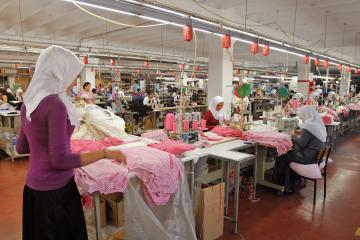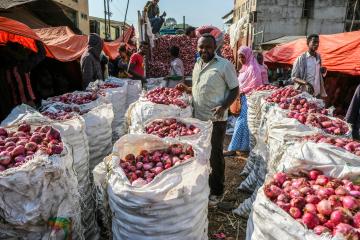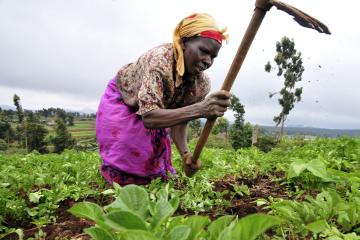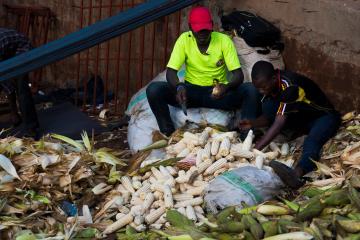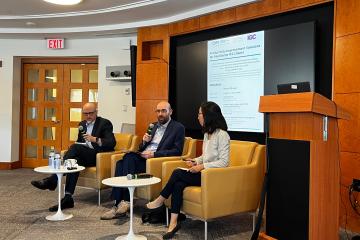
Stronger connections between farmers and buyers enable farmers to invest and earn more.

Governments, agribusinesses, and consumer goods companies in low- and middle-income countries should build agricultural markets that work for farmers, buyers, and consumers. This means focusing on small but effective interventions that encourage farmers’ participation in markets, such as digital marketplaces, contract farming, quality certification, and more.
Connect farmers to buyers through predictable, transparent channels. Agricultural buyers and governments should promote contracts between buyers and sellers, price guarantees, or other pre-harvest agreements to reduce farmers’ risk and help them make profitable investments, including those that improve quality.
Quality-based certification systems, set by international certifying bodies or government regulation agencies, help farmers prove the quality of their goods and earn more. When farmers know there is a system in place to help buyers understand quality, they invest in processes that improve their crops. When buyers recognize farmers are selling high-quality goods, they are often willing to pay more.
Many farmers growing food on small plots of land have the potential to grow more and earn more, but they need better links to buyers. For small-scale farmers in low- and middle-income countries, the hardest part of farming often isn’t growing the crops. It’s deciding whether investing in better seeds, fertilizer, or tools will pay off, and finding reliable buyers who will pay good prices once harvest comes. When they know they have a buyer, farmers often plan ahead with confidence and take steps that lead to higher-quality crops. When these farmers, who produce about one-third of the world’s food, produce and earn more, we all benefit.
When farmers have a guaranteed buyer, they can more safely take risks with new technologies like improved seeds and fertilizers to produce better crops. Contracts to secure buyers ahead of time enable farmers to focus on their crops, instead of marketing and sales. They also protect farmers from price swings. From maize farmers in Uganda to a global buyer-led program for coffee farmers in Colombia, studies have shown that when farmers know they’ll have a buyer, they can more reliably invest in high-quality seeds and tools. The result? Farmers make more money and consumers eat better.
Farmers earn more when they can prove their crops are high-quality. Consumers are willing to pay more for higher-quality goods, so traders often pay more when farmers bring them higher-quality crops. But farmers need a way to demonstrate quality and earn trust with buyers, whether they are traders or direct consumers. Evidence from seven studies shows that simple tools such as labeling, weighing, and quality testing goods are effective at helping farmers prove quality and earn more. For example, in Senegal, when a local policy reform added quality labels on bags of onions, onion quality improved—and so did farmers’ profits.
Policymakers can invest in innovations that make connections, encourage trust, and reduce risk. Policy has an important role to play in building, formalizing, and scaling reforms such as systems to grade and certify quality, contracts that guarantee sales, and other types of buyer-seller matching like digital marketplaces. These innovations can improve relationships between farmers and buyers, allowing farmers to invest in production upgrades without worrying that prices won’t recoup those investments. These upgrades also lead to better produce—a win-win for farmers and consumers.
Cost and design considerations
Understanding trade-offs is important when designing market reforms. While some agricultural market improvements can benefit both producers and consumers, others involve important trade-offs between benefits for farmers, traders, private companies, or final consumers. For example, in Uganda’s digital marketplaces, when price information was shared transparently with everyone, traders who were profiting from hidden price gaps between sellers (farmers) and consumers lost their ability to exploit that gap, and their profits shrank. Data and evidence from impact evaluations can help policymakers weigh effects on different groups and ensure that market reforms function well and are sustainable.
For buyers, long-term commitment to improving farmers’ market access is key. When programs are short-lived, farmers may not benefit, or worse, experience crop and income loss. Private companies play a crucial role in improving market access, from structuring contracts fairly with opportunity for renewal over the long-run, providing financing for upfront investment in high-quality inputs, offering competitive prices, and empowering middlemen in their supply chains to pay higher prices for quality goods.
Policymakers can help by instituting effective regulations and creating an enabling environment for private sector engagement. Governments play an important role in facilitating contract arrangements, investing in transport infrastructure to connect markets, and making reforms that regulate quality and food safety, benefitting farmers and strengthening local and international markets.
Measuring trade-offs is important when designing market reforms.
Implementing partners
Implementers bring deep local knowledge, technical expertise, and a commitment to evaluation and learning as they bring these programs to life. Many organizations run evidence-informed programs, including the following (listed in alphabetical order); this list is not exhaustive.
- Binh Thuan Dragon Fruit Research and Development Center of the provincial government of Binh Thuan
- Cheetah Paprika
- DrumNet
- Karnataka Milk Federation
- Kudu
- One Acre Fund
- Sauti East Africa
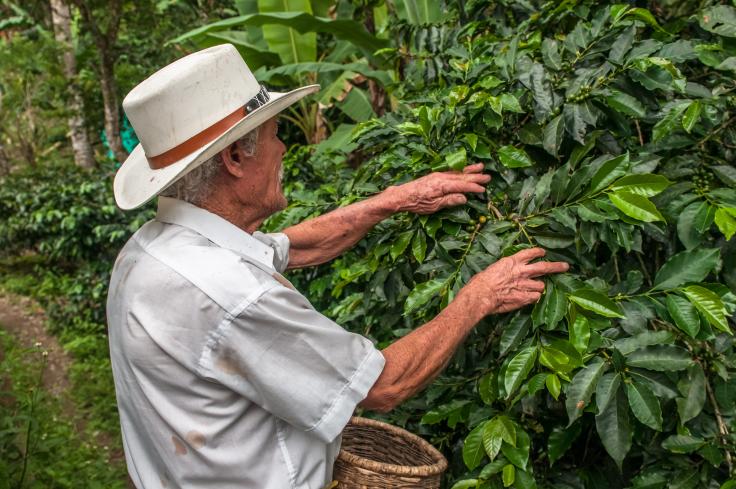
Global and local suppliers of farming inputs and buyers of agricultural produce play a key role in building inclusive and reliable markets for farmers. Often, major corporations, agribusinesses, and investors can practice supportive contracting, stock high-quality inputs, offer reliable prices, and work with policymakers and farming communities on certification and training programs. Field research, some conducted in collaboration with private sector implementing partners, have shown these practices to be effective and design features that drive impacts.
The role of foreign assistance and philanthropy
The Gates Foundation and the UK’s Foreign, Commonwealth and Development Office (FCDO) are contributing to the growing evidence base on this topic through J-PAL and CEGA’s Agricultural Technology Adoption Initiative. The initiative funds research to better understand how to support income generation among farmers through growing farmer productivity, connecting farmers to markets, and expanding commercialization.
Similarly, public-private partnerships can fund and facilitate research on these topics. For example, in partnership with private subsidiary OCP Africa, the UM6P-J-PAL Agricultural Lab for Africa (UJALA) supports rigorous, policy-relevant evidence on small-scale agriculture, subsidies, commercialization, and food security in Africa.
Discover more from J-PAL
Discover more from other sources
Photos:
(1) Credit: BlackBoxGuild, Shutterstock.com
(2) Credit: Javarman, Shutterstock.com
